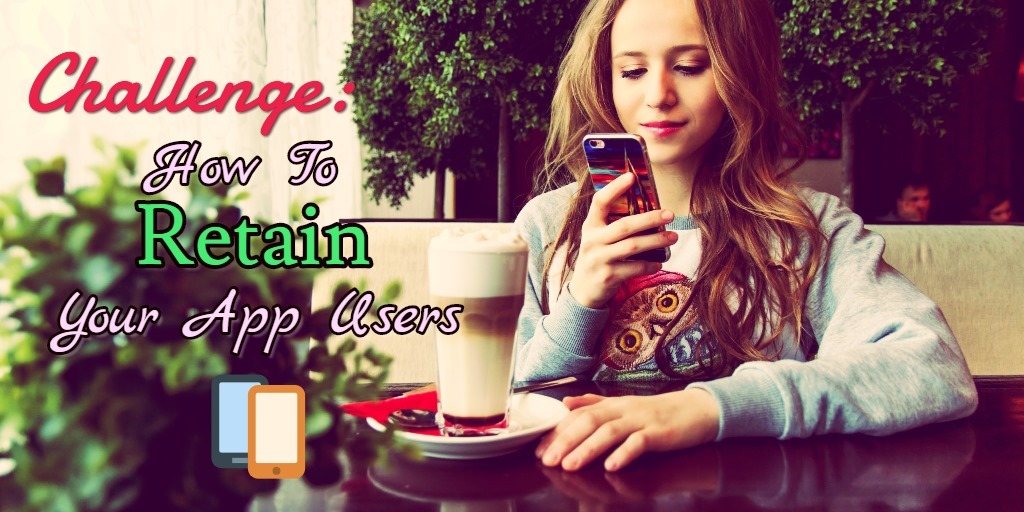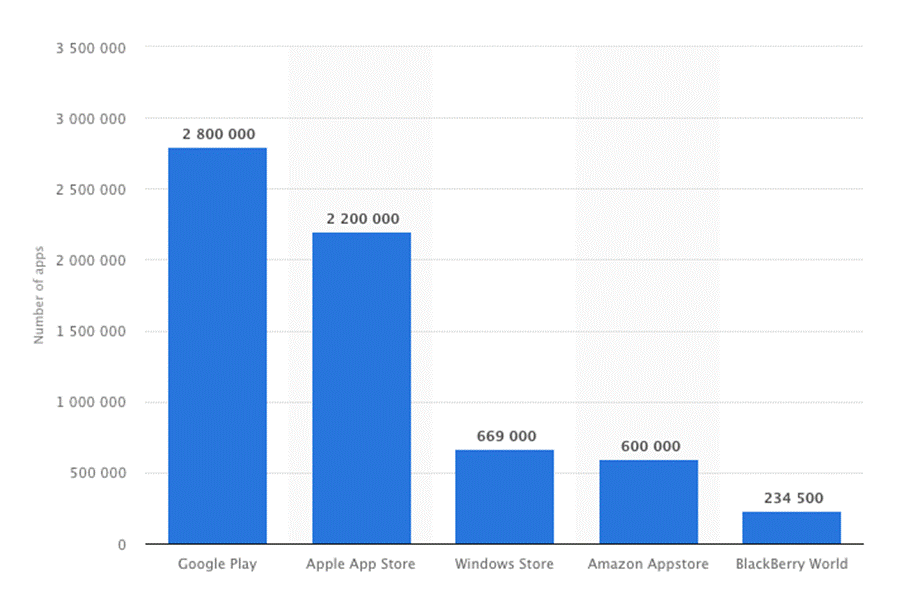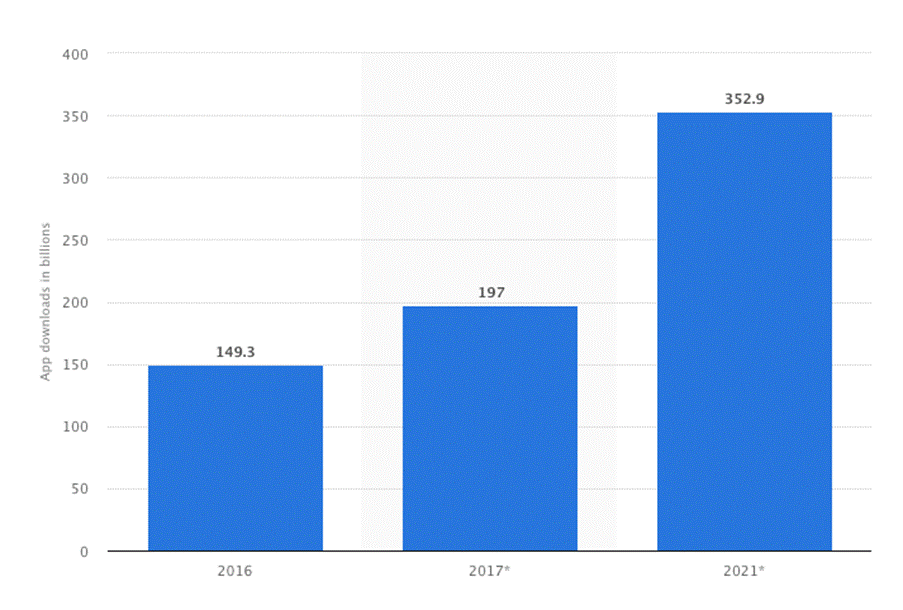
There's no way around it, we live in an app-saturated world. There are well over 4 million apps available via Google Play and Apple App Store alone, and that number is growing every day.
The downside is that your app will be competing in a hotly contested market. The upside is, to put it bluntly, there is a lot of money to be made, with app revenue hitting a record $17 billion in Q3 of 2017. And interest in apps is rising all the time, with 143.9 billion downloads in 2016 and a projected 352.9 downloads by 2021.
The big problem here is churn. You can present the statistics many ways, but it amounts to around 80% of app users churning within 3 months of downloading an app. So, in many ways, the main battle is not to convince customers to download your app, but to get them to stay.
Before we look at strategies to keep users, we need to take a look at why users churn in the first place. If you don't have this insight, you'll struggle to make any headway; you need to understand a problem before you can solve it.
Lack Of Value
Fundamentally, users will only stay with your app if there is a clear, value-adding reason to do so. Look at some of the most popular apps, and it's instantly clear what value they add; from cab booking apps like Uber (a highly convenient service for those out and about), to messaging services like Whatsapp (free, secure global messaging) and takeaway apps like Just Eat (needs no explanation).
Bad First Impressions
You don't have long to make a good impression with your users. If they are presented with a confusing interface, lack of in-app guidance, or lack of functionality... let's face it, they're gonna churn.
It Doesn't Do What It Says On The Tin
Once you have convinced users to download your app, you then need to make good on delivering the functionality that you sold them on in the first place. Uber can hail a cab within three minutes, Whatsapp is so highly encrypted that even spooks can't crack it, and Just Eat... well, it makes with the food.
How To Keep Your App Users
Ask Not What They Can Do For You...
The famous slogan, "ask not what your country can do for you, but what you can do for your country", as memorable as it is, sounds like a fairly shaky motivator to contemporary ears. Because ultimately, although your aim is to - let's be crude - make money from your customers, that's only going to work long-term if you are genuinely offering them real value.
Companies need to ask themselves, not only what it is they can do for their customers, but how their apps fit into this picture. What value does your app offer? If you have a clear and honest understanding of this, you are at the beginning of wisdom when it comes to keeping your app users.
Demonstrate Value From The Get-go
When users first open your app they have already been sold on it's benefits or they wouldn't have downloaded it. The trick is to, when users first open your app, offer them something that will give them a concrete understanding of what they can get out of it. One way to do this would be to offer some kind of discount or offer, exclusive to app users or at least easily accessible to them. If users know they can, for example, get 5 or 10% off of all food orders made via your app, they have a very real incentive to keep using it. Why wouldn't they?
Softly, Softly, Keepy User
Be careful not to bombard new users with a plethora of permissions and notifications; at all times you want to encourage a smooth user experience (that's UX to all the cool kids).
To keep users, you want to beguile them and keep them engaged, not shower them with affection; the parallel of user retention with dating is a bit overused, but there's some truth in it. Don't overdo it.
Be Personal
People have a world of choice available to them, and with a mass of user data at our fingertips there's no excuse not to relate to app users on a personal basis.
Using emails and push notifications is important in the battle to retain app users, but you have to use them in the right way and do it with a personal touch.
Get A Grip On Your Email Messaging
Email is the bread and butter of user engagement; what successful brand doesn't have a subs list these days? But without a personal touch, email is a blunt instrument and it could even put-off app users. Email is an opportunity to find the right way to relate to your users and to show them what your app has to offer.
Use segmentation to create specific sub-sections of your list and send targeted emails. Use their name in your messages; so, "Hi, Firstname", blah, blah, blah. Except, of course, what follows most certainly can't be blah. You should find ways to show how your app offers functionalities that your user can take advantage of.
Prioritise Sending In-app Messages
Sending in-app messages may seem counterintuitive; users are already using your app, so why bother them at this stage? Well, the data shows this is a solid way to boost app launches by 21% each month.
A simple way you can use in-app messages is to encourage users to sign up for push notifications and other opt-in features that will enhance their engagement and offer them greater value.
The Hopper flight booking app uses a combination of full-screen welcome messages and push notifications to show users how they will benefit from signing up to pushes.
Notice how the full screen messages walk the user through the value they will get from signing up to push notification and then a push is served? Pretty neat.
Get Performance Right
It doesn't matter how much functionality you throw at a user if your app doesn't perform right. We've surely all experienced the frustration that comes with a poor-performing brand. It's just not worth the hassle.
So sit down with your developer and make sure your app's performance is optimised. This means things like caching and compressing images to improve load times, re-using templates to speed up page loading times and only loading data when it's needed. Interestingly, users experience app load times as 15% slower than they actually are; so make sure you put up some sort of loading screen that engages users whilst your app loads.
At the end of the day, keeping app users is a process that requires attention to detail and a willingness to embrace trial and error. Take the time to find out the pain points that users face and work out how to solve them.
Your aim should be to build up a deep understanding of what value your app offers and to deliver this value smoothly and intuitively. If in doubt, get in touch with app design or marketing experts to ensure your users keep coming back for more.


